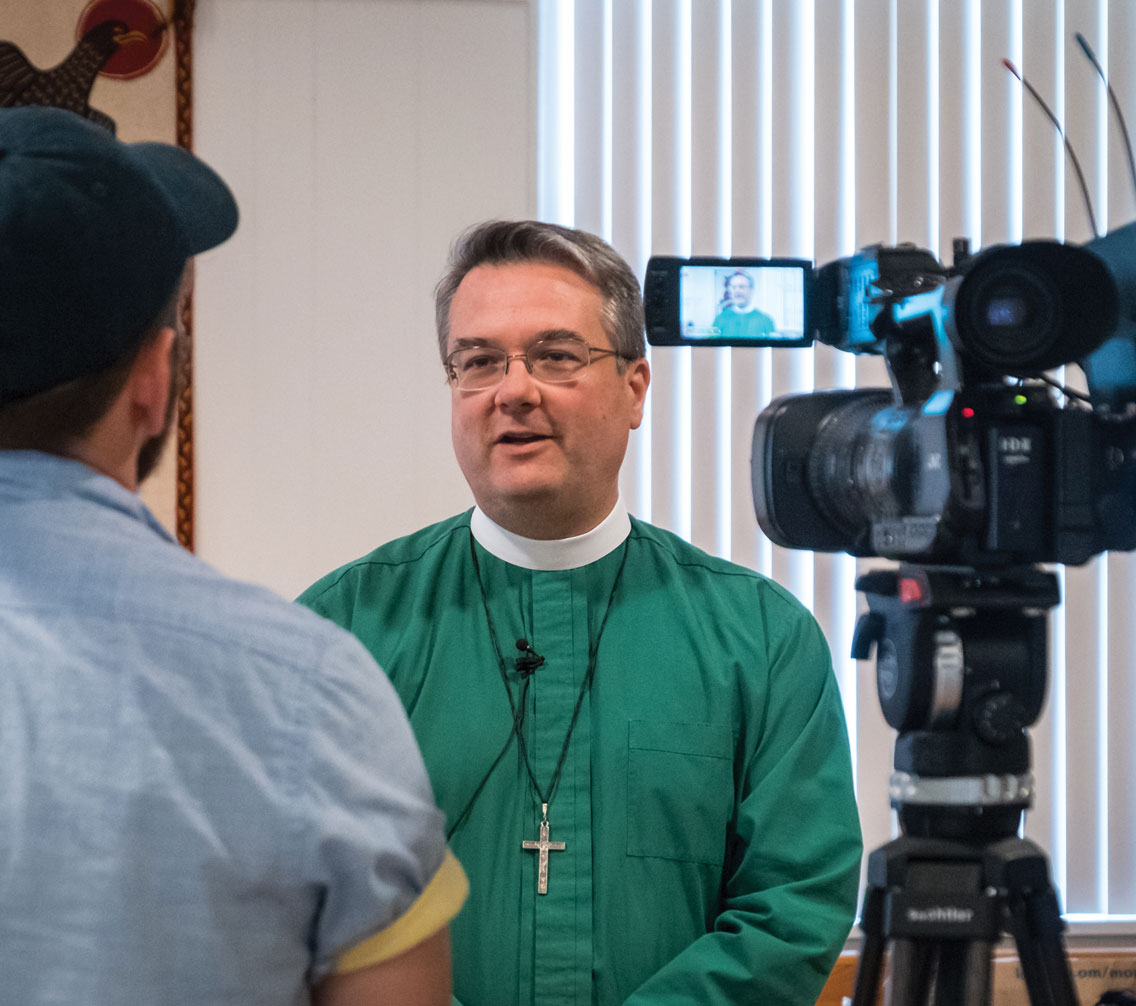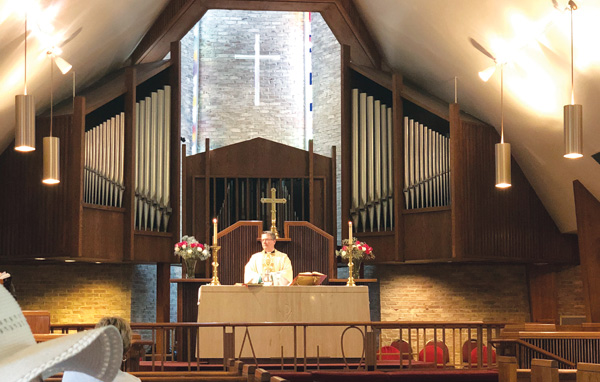Set the Captives Free:
The Reverend Brian McVey '90 Works to End Human Trafficking
From The Record, Fall 2019
Call it indentured servitude, call it human trafficking, or call it slavery as McVey does. However you label it, the woman standing in front of McVey—wearing nothing but a sequined dress, shivering in the below-freezing temperature, eyes darting in fear from side to side—was trapped in its web with no hope of escape. By the time McVey met her outside a truck stop in February of 2006, “Karen” [McVey changed her name for privacy] had been bought and sold four times since she was first lured to America under the pretense of a job as a seamstress.
Offering her warm coffee and a bite to eat, McVey slowly earned her trust and learned her story during several encounters over the following weeks—a story of physical and sexual assault, of stolen papers and passports, of mounting debts to her handlers and a constantly changing location in a foreign country whose geography she did not know.
 Thirteen years later, McVey, an Episcopal priest by-way-of financial broker, has become a leading advocate in the fight to abolish human trafficking, working alongside his parishioners and other activists to rescue victims, support survivors, educate the public, and lobby all levels of governmental and ecclesiastical power. His advocacy has even garnered the attention of Canterbury and Rome: McVey was tapped to be one of 20 members of the ecumenical Consultation on Modern Slavery and Human Trafficking, held at the Vatican in November 2014.
Thirteen years later, McVey, an Episcopal priest by-way-of financial broker, has become a leading advocate in the fight to abolish human trafficking, working alongside his parishioners and other activists to rescue victims, support survivors, educate the public, and lobby all levels of governmental and ecclesiastical power. His advocacy has even garnered the attention of Canterbury and Rome: McVey was tapped to be one of 20 members of the ecumenical Consultation on Modern Slavery and Human Trafficking, held at the Vatican in November 2014.
“Pope Francis and Archbishop of Canterbury Justin are working together as much as they can to live out Jesus’s prayer of unity in the book of John,” he explains. “The Anglican and Catholic churches have some significant differences, but one of the places we can work together is the fight against human trafficking. Both the Pope and the Archbishop of Canterbury think that the church should be leading the world in this fight,” says McVey.
As a young man entering college, however, McVey never expected his life to follow the path it has. “I came to Hampden-Sydney expecting to be a pediatrician, but then Dr. [James] Arieti got ahold of me,” he says with a chuckle. So he earned his undergraduate degree in classics before heading deeper into academia at the University of Dallas Institute of Philosophic Studies, where he was offered a fully-funded graduate degree on the merits of his Hampden-Sydney education, because, he says, “Hampden-Sydney’s reputation precedes any and all of our students wherever they go.”
McVey completed a master’s degree in philosophy and began work on his doctorate, but at the suggestion of his academic advisor took a break from his studies—a decision that launched an unexpected financial career with a regional investment brokerage. Although a transfer to the firm’s home office took McVey and his family from Texas to Iowa and ended his studies at the University of Dallas, his passion for learning and teaching never waned. In 2002, an ordination committee recognized that passion and called him into Episcopal ministry, which led him to a Davenport, IA, parish for eight and a half years and, eventually, to his work rescuing victims of human trafficking.
McVey finds that a good portion of his advocacy on the issue involves convincing people that slavery not only exists in the United States, but is in fact thriving. He understands—he was a skeptic himself until a series of events almost 15 years ago opened his eyes to the issue. He first heard of modern-day slavery at a diocesan conference in 2006, when a resolution condemning human trafficking came up for a vote.
"Slavery. How can we better sum up the illegal trade in human beings for the purposes of commercial sexual exploitation or forced labor? Slavery knows no borders, knows no socio-economic limits, knows no racial preference, and is the best word to describe those who are forced to work for no pay, whether they are prostitutes owned by men or women who sell them or special needs men working in a turkey processing plant in rural Iowa."
-The Reverend Brian McVey
“I thought, ‘Wait a minute. Didn’t we fight a war to end slavery?’” McVey recalls. But a conversation with the resolution’s authors convinced him to investigate several known sex trafficking locations in particular, a truck stop that sees some 15,000 people pass through its doors each day.
It was there that McVey saw Karen, whom he remembers as “the first slave I ever met.” Through his own investigation and conversations with both the Department of Justice and FBI, he soon learned that the $150 billion industry enslaves more than one million individuals in the United States alone, according to government estimates, with somewhere between 21 million and 47 million people enslaved worldwide. And some of those were being trafficked right in his parish’s own backyard.
McVey’s experience that day and in the following months led him to establish what he calls “a ministry of presence.” Wearing his clerical collar and working with female volunteers from his parish to put potential victims at ease, McVey spent hours every week at local truck stops with a display that read: Prayer, Conversation, Communion, and Healing. What they found, he explains, is that exploited women feel “everyone wants something from them, except men in collars and women in habits.”
His parish ministry grew into Attacking Trafficking, an interfaith group committed to ending human trafficking and providing health and healing for survivors. In fact, it was McVey’s close collaboration with the Catholic Bishop of Iowa that first drew the Vatican’s attention to his efforts, ultimately resulting in his invitation to Rome.
 The call came at a time when McVey had been asked to consider a move to a larger parish, and he and his wife were exploring the new opportunity in Nashville, TN. “I was standing in our room at the Holiday Inn Express when the phone rang,” he says with a laugh. “I answered it, and a woman with a British accent told me she was calling from Archbishop of Canterbury Justin’s office with an invitation to a meeting at the Vatican. I thought it was a prank and said, ‘Thanks, but no thanks.’ Thankfully she called right back!”
The call came at a time when McVey had been asked to consider a move to a larger parish, and he and his wife were exploring the new opportunity in Nashville, TN. “I was standing in our room at the Holiday Inn Express when the phone rang,” he says with a laugh. “I answered it, and a woman with a British accent told me she was calling from Archbishop of Canterbury Justin’s office with an invitation to a meeting at the Vatican. I thought it was a prank and said, ‘Thanks, but no thanks.’ Thankfully she called right back!”
McVey calls his time in Rome “a phenomenal experience getting to meet people who are doing incredible work around the world.” A personal highlight for him, however, was the pastoral care he experienced from Pope Francis, who prayed intentionally and individually for each of the 20 participants. He corresponded with participants daily, responding to and following up on their personal prayer requests. The Pope advised McVey on the delicate balance between his advocacy work and his pastoral responsibilities to his parishioners, offered prayer for McVey’s family and their transition from Davenport to Nashville, and even referenced the worry his family was experiencing about the potential closing of Sweet Briar College, where McVey’s eldest daughter was a student.
Of course, the visit also fulfilled a life-long dream for McVey, a classics major at Hampden-Sydney, to see the ancient city of Rome. “When I left the brokerage business to enter full-time ministry, I gave up every hope of visiting Rome,” McVey says, “but this opportunity allowed me to see parts of the city I couldn’t have seen even if I were a multi-millionaire.” On the day that the group was to enjoy a private tour of the Sistine Chapel and Catacombs, however, Pope Francis made a last minute change to the itinerary, sending them to the dank, dark dungeon of Mamertine Prison, where St. Paul was imprisoned before his execution.
 “We spent several hours in Paul’s prison, and I didn’t understand why until the Pope sent a message reminding us why we were there,” he recalls. “We had a ministry like Paul’s, we were fighting evil, and we needed to be reminded that in the end—just as the emperor eventually bowed his knee three centuries later—God would win this battle, too. If I had any doubts about how invested Pope Francis was in what we were doing—I’d spent years trying to convince people that human trafficking was real and it was finally becoming a popular issue—this was a powerful reminder that the Pope and Archbishop weren’t just using it for PR.”
“We spent several hours in Paul’s prison, and I didn’t understand why until the Pope sent a message reminding us why we were there,” he recalls. “We had a ministry like Paul’s, we were fighting evil, and we needed to be reminded that in the end—just as the emperor eventually bowed his knee three centuries later—God would win this battle, too. If I had any doubts about how invested Pope Francis was in what we were doing—I’d spent years trying to convince people that human trafficking was real and it was finally becoming a popular issue—this was a powerful reminder that the Pope and Archbishop weren’t just using it for PR.”
Since the conclusion of the Rome Consultation, participants have been tasked with creating a plan to fight human trafficking at every level, from the parish level to the international level. McVey, in particular, is working on a global survey to gather peer-reviewed data on what really works in rescuing and rehabilitating survivors of slavery. “The peer-reviewed data will help us create a model of shelters that experts tell us work—doctors, mental health professionals, educators, vocational people—so that we can gauge the cost of operating such shelters in different countries and then endow these facilities around the world, not just in the United States,” he says. Stanford University and the University of Northern Colorado have agreed to review the data once it is gathered, and fundraising efforts are well underway.
McVey’s goal is lofty: he aims to raise between $500 and $750 million to endow a global network of shelters based on best practices. “We never want shelters to feel like they’re in competition for funds,” he says, also explaining that sex trafficking shelters save society money in the long term. “It takes about two years to get the slave out of the heart and mind of a rescued woman, but research shows that money spent on educational or vocational training for survivors saves millions of dollars down the road in welfare, healthcare, and disability costs.”
His involvement with the Vatican conference widened McVey’s focus beyond active rescue of victims at truck stops and restaurants; he now teaches others to recognize trafficking and connects people with existing ministries around the country. And the move from Iowa—where awareness of and the fight against human trafficking is minimal—to Tennessee—where law enforcement actively engages in rescue efforts and shelters for victims are well-established—gave McVey the opportunity to go with police on raids, offering women a way out of bondage and the safety of a shelter rather than prosecution and prison.
He’s also involved in educating others about this topic that so few want to discuss. From continuing education seminars for emergency healthcare providers to continuing education presentations for members of the judicial branch, McVey takes every opportunity to inform those in society who may come into contact with victims of human trafficking without being aware of it.
He has even shared the harsh facts about human trafficking at Hampden-Sydney the past two years, speaking at Wilson Center and classics department events; now that two of his sons have joined the brotherhood, senior Nathan McVey ’20 and sophomore Robert McVey ’22, he and his family find themselves back on the Hill frequently.
Despite increased publicity and advocacy about human trafficking in recent years, the work is arduous and at times discouraging. Like Karen, who first opened McVey’s eyes to the realities of modern slavery, many victims of trafficking reject offers of rescue, unable to believe that anyone would want to help someone like them. “The last time I saw Karen,” McVey sighs with resignation, “the left side of her face was severely bruised. She had tried to cover it with makeup, but it was too much to hide. The man who owned her had beat her because she wasn’t making him enough money.”
McVey had recognized Karen as a victim of trafficking, earned her trust, and secured a plan for her escape and rehabilitation. But it wasn’t enough. “She wanted to believe someone cared. She wanted to believe that someone could help,” McVey recalls. “She just could not trust enough to place her hand in mine and leave that life once and for all. My last image of Karen was of her walking away from my outstretched hand.”
But for all of the victims who walk away, countless others find the strength to move from victim to survivor—a trend McVey hopes will increase as a result of the ever-growing global movement to end slavery once and for all.
